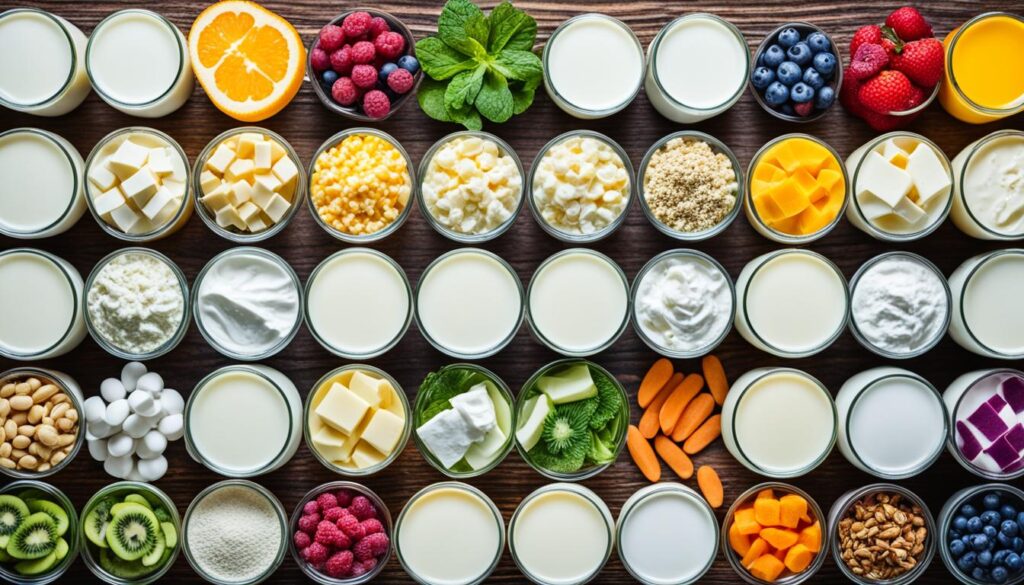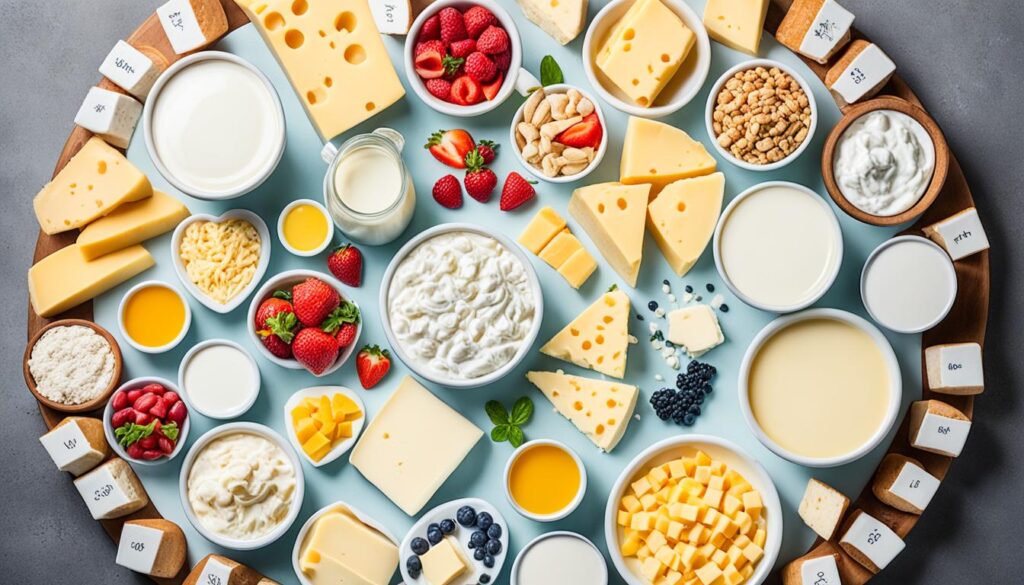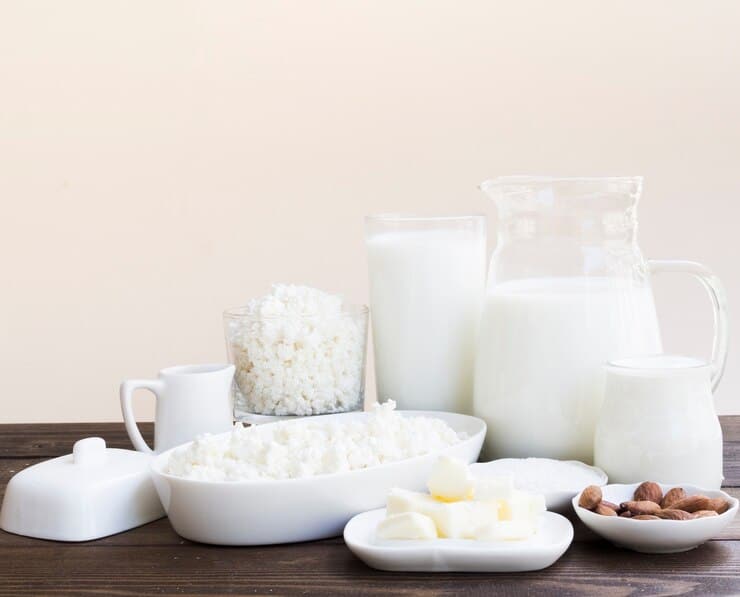Dairy foods come from the milk of mammals like cows, sheep, goats, or buffaloes. They include items like regular and lactose-free milk, yogurt, cheese, and kefir. You’ll also find milk in foods like ice cream, butter, ghee, cream, sour cream, cream cheese, whey products, and casein.
These foods are packed with nutrients. They give you 18 of the 22 essential nutrients your body needs. You’ll find vitamins, minerals, probiotics, and antioxidants in them.
The type of fatty acids in dairy can change based on the animal’s diet and how it’s raised. For example, milk from grass-fed cows has more omega-3s and CLA than milk from cows eating grains. Learning about the different types of dairy and their nutrients can help us understand their health benefits.
Key Takeaways : Types Of Dairy Foods
- Dairy foods are made from or contain the milk of mammals like cows, sheep, goats, or buffaloes.
- They are full of nutrients, giving you 18 of the 22 essential nutrients your body needs.
- The fatty acid content in dairy changes based on the animal’s diet and how it’s raised. Grass-fed cow milk has more omega-3s and CLA.
- Learning about the different types of dairy and their nutrients helps us see how they affect our health.
- People with lactose intolerance or other dietary needs should watch their dairy intake when eating a balanced diet.
What is Dairy?
Dairy includes foods made from the milk of mammals like cows, sheep, goats, or buffaloes. It covers a wide range of products. These include regular and lactose-free milk, yogurt, cheese, and kefir. It also includes milk-based items like ice cream, butter, ghee, cream, sour cream, cream cheese, whey products, and casein.
Definition and Overview of Dairy Products
Dairy products are made using different techniques and processes. These methods improve their taste and quality. For example, liquid milk can become semi-skimmed, skimmed, evaporated, or powdered. This process removes fat or water to make lower-fat or dried milk.
Also, vitamins and minerals might be added to dairy products for extra nutrition. This makes them healthier.
Pasteurization is another important step for dairy items. It uses heat to kill harmful microorganisms. This process helps prevent spoilage and keeps consumers safe.
| Dairy Product | Definition | Composition |
|---|---|---|
| Milk | The liquid produced by the mammary glands of female mammals, primarily used for nourishing their young. | Milk is composed of water, fat, proteins (casein and whey), lactose, and various vitamins and minerals. |
| Yogurt | A fermented dairy product made by the bacterial fermentation of milk. | Yogurt contains milk proteins, fat, carbohydrates, and live active cultures of beneficial bacteria. |
| Cheese | A food derived from milk that is produced in a wide range of flavors, textures, and forms by coagulation of the milk protein casein. | Cheese is composed primarily of milk fat and milk protein, along with various other nutrients depending on the type of cheese. |
“Dairy products are an excellent source of calcium, protein, and other essential nutrients that are important for maintaining good health.”
Nutritional Profiles of Dairy Products

Dairy products are known for their rich nutrient content. They offer a wide range of vitamins, minerals, and macronutrients. Looking into the dairy nutrient composition shows how these foods can boost health when added to our diets.
Dairy’s core nutrients include dairy macronutrients. A single cup (244 ml) of whole milk has 8 grams of protein, 8 grams of fat, and 11 grams of carbohydrates. This makes it a great source of energy. It’s also packed with dairy micronutrients like vitamin B12, calcium, phosphorus, vitamin D, and potassium.
The type of nutrients in dairy can change based on the diet and treatment of the animals. For example, milk from cows eating grass has more omega-3 fatty acids and CLA than regular milk. These substances are good for health, showing why knowing about dairy’s nutrients is key.
| Nutrient | Whole Milk (1 cup) |
|---|---|
| Calories | 146 |
| Protein | 8 g |
| Fat | 8 g |
| Carbohydrates | 11 g |
| Vitamin B12 | 55% of DV |
| Calcium | 23% of DV |
| Phosphorus | 20% of DV |
| Vitamin D | 13% of DV |
| Potassium | 8% of DV |
Knowing the full dairy nutrient composition helps people choose the best dairy products for their diets. This way, they can enjoy the unique health benefits these foods offer.
Health Benefits of Consuming Dairy Products

Dairy products are good for your health. They help with strong bones, weight management, and preventing chronic diseases. Adding dairy to your diet is a smart move for staying healthy.
Dairy and Bone Health
Calcium is key for strong bones, and dairy is a great source. Drinking milk and eating cheese can make bones denser. This can lower the chance of osteoporosis, especially in older people. Studies link dairy with fewer fractures in seniors.
Dairy and Weight Management
Dairy might help keep your weight in check. Some studies show that dairy, with a low-calorie diet, can cut down on fat and increase muscle. This can lead to a healthier body shape.
Dairy and Chronic Disease Prevention
Yogurt is good for your health, especially against type 2 diabetes and metabolic syndrome. Yogurt’s probiotics help control blood sugar. While dairy’s effect on heart health varies, fermented types like yogurt and kefir can boost cholesterol and lower heart disease risk.
| Health Benefit | Dairy Product | Key Findings |
|---|---|---|
| Bone Health | Dairy (e.g., milk, cheese, yogurt) | Improved bone density, reduced osteoporosis and fracture risk |
| Weight Management | Dairy (e.g., milk, cheese, yogurt) | Reduced fat mass, waist circumference, and increased lean body mass when combined with a reduced-calorie diet |
| Chronic Disease Prevention | Yogurt | Lower risk of type 2 diabetes and metabolic syndrome, improved cholesterol levels and reduced risk of high blood pressure and heart disease |
Dairy is great for your health. It supports strong bones, helps with weight, and may lower chronic disease risk. Adding dairy to your diet is a smart choice for staying healthy.
Types Of Dairy Foods

Dairy foods include a wide range of products for different tastes and diets. From simple cereal with milk to rich ice cream sundaes, there’s something for everyone. Let’s look at some common dairy foods:
- Milk – Milk is a key dairy product, used in many recipes and enjoyed by itself. It varies in fat content, from low-fat to whole.
- Yogurt – Yogurt is a favorite, available plain or flavored. It’s known for its probiotics and creamy taste.
- Cheese – Cheese has many types, from soft to hard. It’s great as a topping, snack, or in recipes.
- Ice Cream – Ice cream is a frozen delight with many flavors and forms. It’s perfect for scoops or sundaes.
- Butter – Butter is versatile, used for cooking, baking, and on toast.
- Sour Cream – Sour cream is rich and creamy. It’s often used as a topping or in dishes like tacos and dips.
These are just a few examples of the many dairy foods out there. Each type has its own nutritional benefits and uses in the kitchen. They meet different dietary needs and tastes.
“Dairy foods are a cornerstone of a balanced diet, providing essential nutrients like calcium, protein, and vitamins.”
Potential Downsides of Consuming Dairy Products
Dairy products are usually good for us, but they have some downsides. One big issue is lactose intolerance, which is when people can’t digest the sugar in milk and dairy. This affects about 65% of adults worldwide and can cause gas, bloating, and diarrhea.
There’s also a link between dairy and some cancers. Dairy can increase insulin-like growth factor 1 (IGF-1), which might raise the risk of prostate, breast, and colorectal cancers. Also, some dairy has a lot of saturated fat, which was once seen as bad for the heart. But now, research says dairy fat might not be as bad as meat fat.
Lactose Intolerance and Concerns About Saturated Fat
People with lactose intolerance might not eat much dairy, but they can sometimes handle small amounts. This includes fermented dairy like yogurt and aged cheese. The worry about dairy saturated fat concerns has changed too. Studies now suggest dairy fat might not be as bad as we thought.
| Potential Downside | Explanation | Mitigation Strategies |
|---|---|---|
| Lactose intolerance | Inability to properly digest the natural sugar in milk and dairy products, leading to digestive issues. | Consuming fermented dairy products or lactose-free options, or limiting dairy intake. |
| Dairy and cancer risk | Dairy consumption may stimulate the release of IGF-1, which is associated with an increased risk of certain cancers. | Maintaining a balanced diet and consulting with healthcare professionals. |
| Saturated fat concerns | The high saturated fat content of some dairy products has been historically linked to heart health issues. | Choosing low-fat or non-fat dairy options and considering the nuanced relationship between dairy fat and health. |
Dairy products are great for our health, but we should know about these downsides. It’s key to think about our own needs and likes when adding dairy to our diets.
Dairy and Specific Health Conditions

Dairy products have been studied a lot for their effects on health. They are linked to bone health, diabetes, and heart disease. Researchers and experts keep looking into how dairy affects our health.
Dairy and Bone Health
Dairy has calcium, protein, and phosphorus which are key for strong bones. Studies show that eating dairy can lower the risk of osteoporosis and fractures. But, eating leafy greens and legumes can also help with bone health.
Dairy and Diabetes
The link between dairy and diabetes is not simple. Some research says dairy can help prevent type 2 diabetes. But, other studies don’t find a strong link. The type of dairy, its fat content, and your diet and lifestyle matter a lot.
Dairy and Heart Disease
There’s a lot of debate about dairy and heart health. Some studies say low-fat or non-fat dairy can lower heart disease risk. But, the fat in some dairy products worries people about heart health. It’s best to eat dairy in moderation and think about your own health needs.
| Health Condition | Potential Impact of Dairy |
|---|---|
| Bone Health | Positive – Dairy provides essential nutrients for bone health and may reduce the risk of osteoporosis and fractures. |
| Diabetes | Mixed – Some studies suggest dairy may lower diabetes risk, while others find no significant association. |
| Heart Disease | Mixed – Low-fat or non-fat dairy may be associated with lower heart disease risk, but high saturated fat content is a concern. |
It’s key to remember that your health, what you like to eat, and your lifestyle affect how dairy impacts you. Talking to a health expert can help you decide if dairy is good for you.
Sustainable Dairy Consumption

Looking at dairy in our diets, we must think about its effect on the environment. Making dairy foods uses a lot of land and water. Animals like cows, sheep, and goats also produce methane, a strong greenhouse gas.
The “planetary health diet” suggests eating about 250 grams of dairy a day. That’s like one 8-ounce cup of milk, yogurt, or cheese. This amount is better for the planet than the high dairy intake in many places.
If everyone ate 2 or more dairy servings daily, it would be hard to stop climate change. So, moderating dairy intake is key for our health and the planet’s.
Choosing sustainable dairy consumption lets us get the nutrients we need without harming the environment. It helps keep our planet healthy for the future.
“Moderating dairy intake as part of a balanced, healthy diet is recommended for both personal and planetary health.”
Also Read : How to Make Vegan Buffalo Wings?
Conclusion
Dairy products are full of nutrients and can be good for our health. They help keep bones strong, might lower the risk of type 2 diabetes and heart disease, and can improve how our bodies look. But, we should think about the downsides like lactose intolerance and the possible link to some cancers.
The kind and amount of dairy we eat matter a lot. Foods like yogurt and aged cheeses might be especially good for us. It’s also key to think about how dairy farming affects the planet. Eating dairy in a balanced way is good for us and the Earth.
Dairy can be a healthy choice for our meals, but it depends on what we like and need. Knowing about the dairy product health benefits, dairy consumption recommendations, and sustainable dairy consumption helps us make better choices. This way, we can take care of our health and the planet.
FAQs
Q. What is dairy?
Dairy comes from the milk of mammals like cows, sheep, goats, or buffaloes. It includes foods like regular and lactose-free milk, yogurt, cheese, and kefir. It also covers milk-containing products like ice cream, butter, and cream cheese.
Q. What are the nutritional profiles of dairy products?
Dairy is packed with nutrients, offering 18 of the 22 essential nutrients. A 1-cup serving of milk gives you 146 calories, 8 grams of protein, 8 grams of fat, and 11 grams of carbs. It’s also a good source of vitamins B12, calcium, phosphorus, vitamin D, and potassium.
Q. What are the potential health benefits of consuming dairy products?
Eating dairy can help improve bone density and reduce osteoporosis risk. It may also help with body composition, type 2 diabetes prevention, and cholesterol levels. Plus, it could lower the risk of high blood pressure and heart disease.
Q. What are the different types of dairy foods?
Dairy foods range from simple cereal with milk to indulgent ice cream sundaes. Common dairy items include milk, yogurt, cheese, kefir, ice cream, and butter. Other types are ghee, cream, sour cream, cream cheese, whey products, and casein.
Q. What are some potential downsides of consuming dairy products?
Some downsides include lactose intolerance, affecting about 65% of adults globally. There are also concerns about dairy and certain cancers due to insulin-like growth factor 1 (IGF-1). Some dairy fats are high in saturated fats, which could be bad for heart health. But, recent studies suggest dairy fat might not be as harmful as meat fats.
Q. How does dairy consumption impact specific health conditions?
Dairy can help with bone health by providing calcium, protein, and phosphorus. It’s linked to a lower risk of osteoporosis and fractures. Dairy might also improve body composition and reduce type 2 diabetes and heart disease risk.
Q. What are the recommendations for sustainable dairy consumption?
The “planetary health diet” suggests aiming for 250 grams of dairy daily. This amount is seen as sustainable for both health and the planet. It balances dairy intake with the environmental impact of dairy farming, which uses a lot of land, water, and resources. Dairy animals also produce methane, a greenhouse gas.
Source Links
- https://nutritionsource.hsph.harvard.edu/dairy/
- https://www.healthline.com/nutrition/is-dairy-bad-or-good
- https://www.ncbi.nlm.nih.gov/pmc/articles/PMC8502778/








Leave A Comment